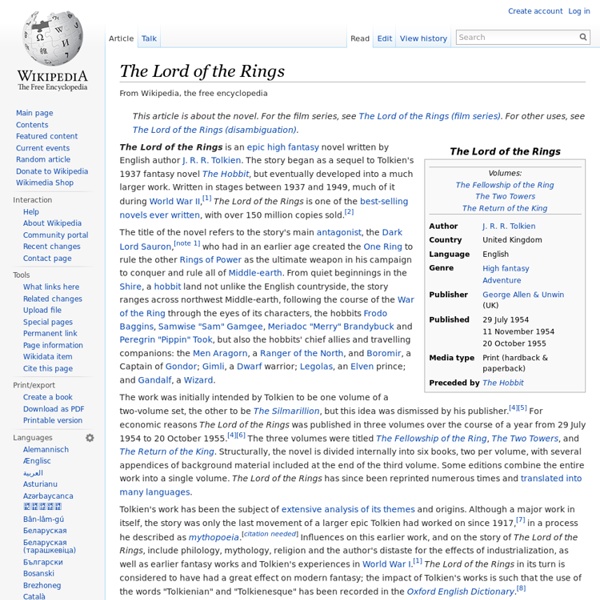J. R. R. Tolkien
John Ronald Reuel Tolkien, CBE (/ˈtɒlkiːn/ TOL-keen;[a] 3 January 1892 – 2 September 1973) was an English writer, poet, philologist, and university professor, best known as the author of the classic high fantasy works The Hobbit, The Lord of the Rings, and The Silmarillion. He served as the Rawlinson and Bosworth Professor of Anglo-Saxon and Fellow of Pembroke College, Oxford, from 1925 to 1945 and Merton Professor of English Language and Literature and Fellow of Merton College, Oxford from 1945 to 1959.[1] He was at one time a close friend of C. S. Lewis—they were both members of the informal literary discussion group known as the Inklings.
Shadow World
Shadow World is a high-fantasy campaign setting situated on the fictional planet of Kulthea. Originally produced for the Rolemaster role-playing game system, the game setting is owned by Iron Crown Enterprises (often referred to as I.C.E.). It is currently maintained by the primary author of the setting, Terry K.
Waiting for Godot
Plot[edit] Act I[edit] Estragon soon dozes off, but, after rousing him, Vladimir is not interested in hearing about Estragon's dreams—another recurring motif. Estragon wants to hear an old joke, which Vladimir starts but cannot finish, as he is urgently compelled to rush off and urinate due to a kidney ailment that pains him whenever he laughs. Estragon next suggests that they hang themselves, but they abandon the idea when their strategy seems infeasible. Estragon asks what Godot is going to do for them once he arrives, but "Oh ... nothing very definite" is the best that Vladimir can manage.[7] When Estragon declares that he is hungry, Vladimir provides a carrot (among a collection of turnips), at which Estragon idly gnaws, loudly reiterating their boredom.
The Lord of the Rings
The Lord of the Rings is an epic high fantasy novel written by J. R. R.
Spacemaster
Space Master is a science fiction role-playing game produced by Iron Crown Enterprises, written by Kevin Barrett, developed by Kevin Barrett and Terry K. Amthor. It is an adaptation of, and mostly compatible with, the Rolemaster Fantasy Roleplaying system, and as such any perceived failings/strengths of the latter also apply to Space Master. Spacemaster is available in two editions, namely Spacemaster 2nd Edition (analogous and broadly compatible with Rolemaster 2nd Edition and Rolemaster Classic) and Spacemaster Privateers (analogous and compatible with Rolemaster Standard System and Rolemaster Fantasy Role Playing). Iron Crown Enterprises has published several expansions, including Space Master Companion I, Space Master Companion II and Aliens & Artifacts, as well as numerous adventure modules and setting sourcebooks.
The Great Gatsby
Fitzgerald—inspired by the parties he had attended while visiting Long Island's north shore—began planning the novel in 1923, desiring to produce, in his words, "something new—something extraordinary and beautiful and simple and intricately patterned."[3] Progress was slow, with Fitzgerald completing his first draft following a move to the French Riviera in 1924. His editor, Maxwell Perkins, felt the book was too vague and convinced the author to revise over the next winter. Fitzgerald was ambivalent about the book's title, at various times wishing to re-title the novel Trimalchio in West Egg.
Rolemaster
Rolemaster is a role-playing game published by Iron Crown Enterprises. Rolemaster has come in four separate editions. The third edition, first published in 1995, is also known as the Rolemaster Standard System (or RMSS for short). There are two editions currently in production.
Nineteen Eighty-Four
History and title[edit] A 1947 draft MS of the first page of Nineteen Eighty-Four, showing the editorial development. George Orwell "encapsulate[d] the thesis at the heart of his unforgiving novel" in 1944, the implications of dividing the world up into Zones of influence had been conjured by the Tehran Conference,[9] and three years later he wrote most of it on the Scottish island of Jura, from 1947 to 1948, despite being seriously ill with tuberculosis.[10] On 4 December 1948, he sent the final manuscript to the publisher Secker and Warburg and Nineteen Eighty-Four was published on 8 June 1949.[11][12] By 1989, it had been translated into sixty-five languages, more than any other novel in English at the time.[13] The title of the novel, its themes, the Newspeak language, and the author's surname are often invoked against control and intrusion by the state, while the adjective Orwellian describes a totalitarian dystopia characterised by government control and subjugation of the people.
Middle-earth Role Playing
Middle-earth Role Playing (MERP) is a 1984 role-playing game based on the writings of J.R.R. Tolkien (specifically The Lord of the Rings and The Hobbit) under license from Tolkien Enterprises. Iron Crown Enterprises (I.C.E.) published the game until they lost the license on 22 Sep 1999.[1] System[edit]
Brave New World
In 1999, the Modern Library ranked Brave New World fifth on its list of the 100 best English-language novels of the 20th century.[1] In 2003, Robert McCrum writing for The Observer listed Brave New World number 53 in "the top 100 greatest novels of all time",[2] and the novel was listed at number 87 on the BBC's survey The Big Read.[3] Title[edit] O wonder!
Iron Crown Enterprises
Iron Crown Enterprises has produced role playing, board, miniature, and collectible card games for 30 years. Many of ICE’s better-known products were related to J. R. R. Tolkien’s world of Middle-earth, but the Rolemaster rules system, and its science-fiction equivalent, Spacemaster, have been the foundation of ICE’s business.



